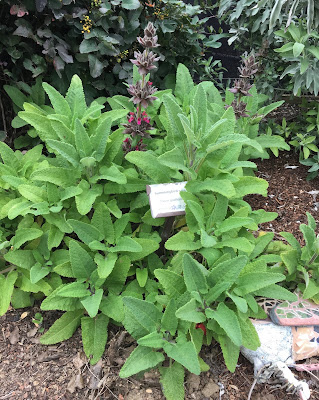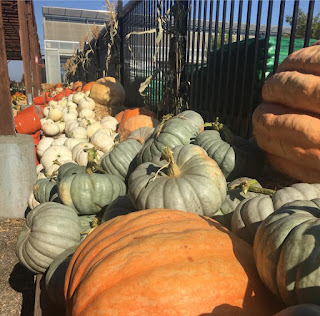
|
Hummingbird sage is a California native and one of the
plants that grows in the UC Davis Arboretum nursery.
Expect see some available at the last sale of the fall Nov. 3.
(Photo: Kathy Morrison)
|
Workshops and events cover key information for fall gardeners
It's just a month now until Thanksgiving and (we hope) the rainy season. There's still time for planting and other fall garden chores, but with the end of daylight saving time also looming (early on Nov. 4), ideal gardening hours are rapidly disappearing.
Here are six topics for fall gardening, and some suggestions from our calendar listings to go with them:
* Composting. If you've ever wanted to start a compost bin, or had questions about what it entails, here's your chance to ask the experts. The UCCE master gardeners offer several workshops in composting. The next in Sacramento County is in Isleton on Nov. 3; it is free. In Sacramento, a free composting workshop will be held 10-11 a.m. Nov. 10 at Sierra2 Center, 2791 24th St. More information at
sacmg.ucanr.edu
. In Placer County, a composting and mulching workshop will be presented by master gardeners 10 a.m. to noon Nov. 10 through the Roseville Utility Exploration Center; cost is $6 for Roseville residents, $8 non-residents. Includes a free compost bin. For ages 14 and up. Sign up at 916-746-1550 or online via
roseville.ca.us
.

|
|
Aretha the cat rests between chores at the Plant Foundry.
(Photo: Kathy Morrison)
|
* Container planting. The
Plant Foundry
Nursery & Store hosts a cool workshop this Saturday, just in time for creating autumn containers that will wow your fall guests. Garden stylist Greg Howes is the teacher. The $45 fee covers all materials. Space was still available as of this (Monday) afternoon, nursery staff assures us. Sign up at the nursery, or over the phone at 916-917-5787. The Plant Foundry is at 3500 Broadway, at 35th Street, Sacramento. Say hi to Aretha the nursery cat, too.
* Fall planting. What's the big deal about planting in the fall? Well, trees, shrubs and perennials put in now have a better chance of getting established, while the soil is still warm but the temperatures are moderate. Learn more about it at Green Acres Nursery and Supply's free workshops, 10-11 a.m. this Saturday, Oct. 27, at the Folsom, Elk Grove and Rocklin locations. Stop in at the pumpkin patch, too, if you haven't bought your Halloween pumpkin yet. Information:
idiggreenacres.com

|
It's still pumpkin season, at Green Acres and elsewhere.
(Photo courtesy Green Acres Nursery & Supply)
|
* Planting California natives. Natives best attract pollinators to your garden. Those bees, birds and butterflies are natives too, after all. And it's hard to top the selection of native plants at the UC Davis Arboretum's teaching nursery, which will hold its last public sale of the fall on Nov. 3, from 9 a.m. to 1 p.m. And there will be plenty of non-native (but still appropriate for our climate) plants as well. Even better: It's a clearance sale, so everything will be marked down at least 20 percent. Members of the Friends of the UC Davis Arboretum and the Davis Botanical Society get 40 percent off their purchases. Information and plant inventory list at
arboretum.ucdavis.edu
* Plant propagation. Make free plants from ones you already have in your garden -- what a deal! Learn different methods of propagation in a free workshop 9 a.m. to noon this Saturday, Oct. 27, at the Sherwood Demonstration Garden, the garden of the UCCE Master Gardeners of El Dorado County. Master Gardeners Debbie Hillel and Gail Fulbeck will teach the workshop. Bring clean gardening gloves. (Psst: It's also the last weekend of the year that this impressive garden will be open to the public.) El Dorado Center of Folsom Lake College, 6699 Campus Drive, Placerville. $2 parking fee; exact change required.
mgeldorado.ucanr.edu
* Tree care. Make sure your young trees will survive the winter. The Sacramento Tree Foundation will present a free class 9 to 11:30 a.m. Nov. 3 on the steps to take so your new trees grow beautiful and healthy. Workshop includes classroom information plus hands-on outdoor practice. Attendees will receive new soaker hoses. Held at the Pannell-Meadowview Community Center, 2450 Meadowview Road, Sacramento. Sign up at
www.sactree.com/events
. The tree foundation also will present a hands-on pruning class 9:30 a.m. to 11:30 a.m. Nov. 17 at the San Juan Water District office, 9935 Auburn Folsom Road, Granite Bay. Reservations required: 916-791-2663.
-- Kathy Morrison



